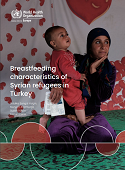Breastfeeding characteristics of Syrian refugees in Turkey (2021)

Download
Turkey currently hosts an estimated 3.6 million Syrian refugees, of whom 23% are reproductive-age women (15–49 years) and 14% are children aged 0–4 years. To achieve the best child survival and development outcomes,WHO recommends that infants start breastfeeding within one hour of birth and are exclusively breastfed for sixmonths, followed by the timely introduction of adequate, safe and properly fed complementary foods with continued breastfeeding until at least 24 months of age.
However, according to the 2019 Turkish Demographic and Health Survey, only 73% of Syrian babies are breastfed within one hour of birth, 24% of babies receive prelacteal food and only about half (51.6%) of children aged 0–5 months are exclusively breastfed. To understand the reasons for this, this study evaluated the perceptions and attitudes of Syrian refugee mothers on age-appropriate breastfeeding and the contributory sociocultural factors. Data were collected in September and October 2020.
The study found that the short duration of breastfeeding is related to the cultural characteristics, migration experiences and low health literacy of mothers, and that health workers need further training in breastfeeding counselling, adapted to the cultural characteristics of Syrian mothers, to effectively support breastfeeding. Training and information campaigns for parents, mothers-to-be and other family influencers should aim to support mothers in optimal breastfeeding practices. Socially appropriate interventions are needed to support the continuation of girls’ education and prevent adolescent marriages and adolescent motherhood. Nutritional support could be provided for breastfeeding mothers.



